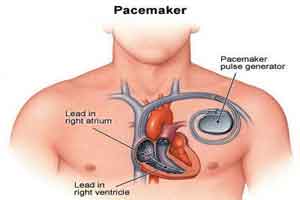- Home
- Editorial
- News
- Practice Guidelines
- Anesthesiology Guidelines
- Cancer Guidelines
- Cardiac Sciences Guidelines
- Critical Care Guidelines
- Dentistry Guidelines
- Dermatology Guidelines
- Diabetes and Endo Guidelines
- Diagnostics Guidelines
- ENT Guidelines
- Featured Practice Guidelines
- Gastroenterology Guidelines
- Geriatrics Guidelines
- Medicine Guidelines
- Nephrology Guidelines
- Neurosciences Guidelines
- Obs and Gynae Guidelines
- Ophthalmology Guidelines
- Orthopaedics Guidelines
- Paediatrics Guidelines
- Psychiatry Guidelines
- Pulmonology Guidelines
- Radiology Guidelines
- Surgery Guidelines
- Urology Guidelines
Flexible, organic batteries may power future pacemakers

Scientists, including one of Indian origin, have designed a flexible and organic supercapacitor that can replace rigid batteries in pacemakers and other medical implants, making them more comfortable for patients.
The flexible device is made up of non-flammable electrolytes and organic composites, which are safe to the human body.
It can also be easily decomposed without incurring the major costs associated with recycling or disposing off metal based batteries.
The findings, published in the journal Energy Technology and Green Chemistry, show that the device could be manufactured using readily available natural feedstock, rather than sophisticated and expensive metals or semiconductors.
"In medical devices such as pacemakers and defibrillators there are two implants, one which is fitted in the heart and another which holds the metal based, rigid batteries - this is implanted under the skin," said Geetha Srinivasan, from Queen's University Belfast in the UK.
"The implant under the skin is wired to the device and can cause patients discomfort as it is rubs against the skin," said Srinivasan.
"For this reason batteries need to be compatible to the human body and ideally we would like them to be flexible so that they can adapt to body shapes," she said.
While the findings show that there are many advantages in the medical world, the organic storage device could also provide solutions in wearable electronics and portable electronic devices, making these more flexible.

Disclaimer: This site is primarily intended for healthcare professionals. Any content/information on this website does not replace the advice of medical and/or health professionals and should not be construed as medical/diagnostic advice/endorsement or prescription. Use of this site is subject to our terms of use, privacy policy, advertisement policy. © 2020 Minerva Medical Treatment Pvt Ltd